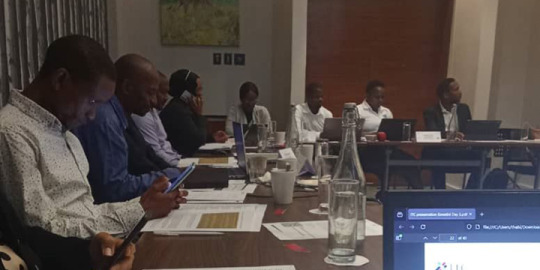#DataAndDesign
Explore tagged Tumblr posts
Text
Enhancing Travel Services Statistics in Eswatini: Insights from ITC Day 3 Training

Mbabane, Eswatini — 16 April 2025 By: Thabiso Njoko
The third day of the International Trade Centre (ITC)’s specialized training on Travel Services in Eswatini brought together statisticians, trade experts, and data professionals to deepen their understanding of trade intelligence through robust data handling techniques. The session emphasized fostering African trade integration by strengthening statistical capacity in travel-related services.
Kickstarting with Coffee & Concepts
After a quick Q&A recap of Day 2, things got serious. The morning dove straight into sampling techniques, using real-world case studies from Spain and France to explore how countries collect data without a complete business registry. The solution? Smart sampling — think stratified methods, population frameworks, and creative workarounds.
“We don’t have to count everyone. We just have to count smart,” one participant noted during the group exercise.
Building Better Data: Processing & Precision
Next came the data processing phase, where participants learned how raw survey responses turn into reliable national statistics. It’s more than just crunching numbers — it’s about linking records, correcting errors, and identifying those wild outliers (like the accommodation provider who over-reported by 100x — ouch!).
Tools and techniques covered:
Regression and ratio imputations
Nearest-neighbour donor methods
Automated editing software (yes, robots helping with stats!)
From France’s donor-clustering method to New Zealand’s COVID-era imputation models, the global examples made it clear: no two countries do it the same, but everyone’s working toward the same goal — better data for better decisions.
Imputations: Filling in the Blanks
If you’ve ever skipped a survey question, you’ve contributed to one of the biggest challenges in statistics: missing values. Day 3 tackled this head-on with exercises on how to handle non-response. Do you adjust the weights? Impute values? Go back and ask again?
Participants learned about:
Longitudinal imputation (filling in today’s blanks using yesterday’s answers)
Weighting adjustments to account for non-responding units
And most importantly — choosing the right method for the right situation
Making Data Speak: Dissemination & Metadata
Stats are only as useful as people’s ability to understand them. The final session explored how platforms like OECD’s Data Explorer, ITC Trade Map, and Eurostat make data accessible through strong metadata and sleek design.
“Where is the wisdom we have lost in knowledge? Where is the knowledge we have lost in information?” — T.S. Eliot, as quoted in the final slide.
A reminder that stats aren’t just about counting tourists — they’re about informing policy, supporting business, and building a stronger future.
Wrapping Up with Smiles (and Certificates)
After hours of exercises, discussions, and plenty of “a-ha!” moments, the day ended with a certificate ceremony. Shoutout to the ITC team — especially Christophe Durand and Katerina Blanchard Joklova — for making data training engaging and hands-on.

Final Takeaway
Whether you’re a tourism officer, a data geek, or just curious about how numbers shape our economy — this training was a powerful reminder that behind every statistic, there’s a story.
And in Eswatini, that story is just beginning.
Lets Connect: Discord | Telegram | Linkedin | X
#MediumWriters#DataStorytelling#WhatMatters#InformedOpinions#MediumAfrica#MediumVoices#ThinkPiece#tourism statistics#internation trade centre#travel data#eswatini#workshop#CreativeEconomy#DesignMeetsData#CreativeAfrica#CultureAndCommerce#ArtOfData#StorytellingWithData#DataAndDesign#CapacityBuilding#DataSkills#KnowledgeIsPower#LearningThroughData#SkillUpAfrica#ProfessionalDevelopment#AfricaRising#EswatiniInsights#AfricanTrade#RegionalIntegration#TourismInAfrica
0 notes